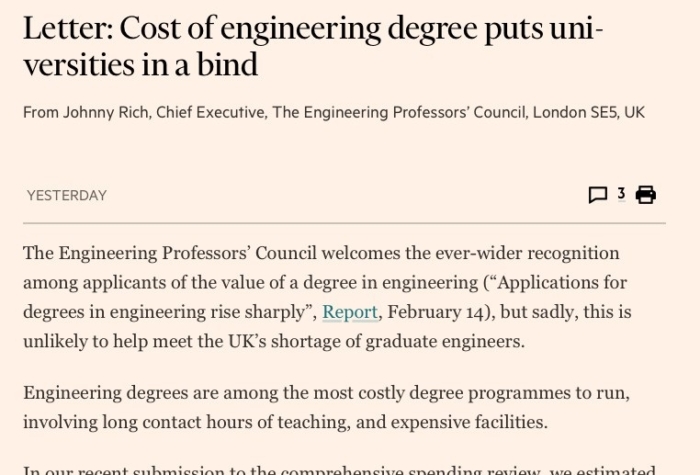The Recruitment and Admissions Toolkit has not been updated as yet but has been left here for archive purposes.
A brief guide to the Scottish educational system: for admissions tutors elsewhere.
Pupils in Scotland move from primary to secondary school one year later than in England and (traditionally) from school to university one year earlier, around age 17. The state school system is almost entirely homogeneous and comprehensive. University degrees are a year longer to compensate for the earlier entry. Thus a BEng typically takes 4 years and MEng takes 5 years. Engineering programmes are usually specialised from the start but most Scottish bachelors degrees provide a broad programme in the first two years followed by specialised honours courses in the final two years; in general Scottish education places a higher emphasis on breadth than in England.
National qualifications are administered by a single Scottish Qualifications Authority (SQA). For many years pupils have taken the following set of examinations.
- Standard grades around age 16 (S4/Y11). Pupils typically study around 8 standard grades; the number of courses has not proliferated as in England.
- Highers after a further year (S5/Y12). The typical load is 5 Highers including English and Mathematics. These are the traditional exit qualifications, accepted for entry to the first year of Scottish degree courses. Many pupils leave school at this level.
- Advanced Highers after another year (S6/Y13). Three Advanced Highers is regarded as a full load but many pupils take a mixture of Advanced Highers and further Highers for increased breadth, which is a deeply rooted feature of Scottish education.
Good grades in Advanced Highers are accepted for direct entry into the second year of Scottish degrees and for entry to universities elsewhere in the UK.
Advanced Highers except Mathematics include an extended practical investigation. - The Scottish Baccalaureate comprises two Advanced Highers, a further Higher and an interdisciplinary project, again encouraging breadth.
It is tempting to compare the qualifications with GCSE, AS and A levels but there are significant differences.
- Highers and Advanced Highers are independent courses, not linked like AS and A2.
- Most courses are taught as three units, which can be taken as standalone but ungraded qualifications. This is typically used to increase breadth; a unit of Higher Statistics is a common choice. Pupils must pass all units to complete a course but the results are not used in the overall assessment, which tests the course as a whole; it covers the units plus further ‘added value’ material that integrates the units. In other words, the courses are not modular in the ‘test and forget’ sense.
- The smaller number of courses means that Scottish qualifications are generally regarded as being slightly stronger than their English equivalents. For example, Advanced Highers are about a grade above A levels: a B in Advanced Higher is roughly equivalent to an A in A level. This is recognised in the UCAS points tariff: AH A=130, B=110, C=90; A-level A*=140, A=120, B=100, C=80, although many Scots would argue that AH should receive somewhat higher scores.
- The provision of Advanced Highers remains patchy; few schools offer a full range.
- Further Mathematics is not available in Scotland although Advanced Higher Mathematics contains topics such as complex numbers that are no longer in Pure Mathematics A level (at least for some boards). Higher and Advanced Higher Mathematics of Mechanics are being introduced but their popularity is doubtful.
This picture is evolving as a result of the Curriculum for Excellence, currently progressing through secondary schools. Major changes have occurred in primary and the earlier years of secondary education but the impact on pre-university qualifications may be small.
- Standard grades were examined for the last time in 2013, now replaced by National 5.
- Highers and Advanced Highers are being revised (after another recent revision). My experience from review groups is that the sciences are using this as an opportunity to restore the academic level after some years of perceived decline. For example the description of Higher Physics says “Structurally, the question paper will be similar to Higher Physics and Revised Higher Physics. However, there will be less emphasis on recall questions and more emphasis on the application of knowledge and skills”. Unfortunately it is not clear how this aspiration can be applied to some of the newly introduced material, mostly astrophysical, which is largely descriptive.
- Revised Higher Physics contains a new half-unit on Researching Physics but it is too early to gauge its value. It may prepare pupils better for the Advanced Higher Investigation. Other subjects except mathematics include a similar exercise.
- Unfortunately there is less positive evidence about mathematics, where students suffer from the same problem of poor basic algebraic skills as in England. However, new courses in Lifeskills Mathematics are being introduced for pupils who need arithmetic more than algebra; this might relieve the pressure to teach traditional mathematics courses to weaker students and allow the curriculum to be strengthened.
- Flexibility is a key feature of the Curriculum for Excellence. For example, it is suggested that pupils might omit National 5 and spend two years on Higher courses instead. They may spread their Higher exams over two years rather than one.
It is hard to know what opportunity will be taken with this flexibility. Most schools may retain National 5 to provide evidence on which future choices of subject can be based, for instance. - Engineering Science is a new suite of courses that replaces Technological Studies, whose popularity has declined. The main topics are electronics, control, mechanisms and structures. It is generally considered as an adjunct to physics rather than a replacement.
Helpful publications
- Qualifications can cross boundaries: A rough guide to comparing qualifications in the UK and Ireland, produced jointly by QAA, Ofqual, the Scottish Credit and Qualifications Framework Partnership, CCEA Accreditation, the Credit and Qualifications Framework for Wales, and Quality and Qualifications Ireland, http://www.qaa.ac.uk/en/Publications/Documents/qualifications-can-cross-boundaries.pdf
- Information for Universities on the New National Qualifications, SQA.
- Scottish universities have issued statements on their approaches to the Curriculum for Excellence.
- Information on Scottish Credit and Qualifications Framework Partnership for HEIs, SCQF.
- Universities Scotland www.universities-scotland.ac.uk have published a guide Beyond the Senior Phase: University Engagement with Curriculum for Excellence They have also produced Implications of Curriculum for Excellence (CfE) in Scottish schools on admissions for universities in England, Wales & Northern Ireland https://www.universities-scotland.ac.uk/publications/cfe-for-the-rest-of-the-uk/
John Davies, revised 2014-12-06
Any views, thoughts, and opinions expressed herein are solely that of the author(s) and do not necessarily reflect the views, opinions, policies, or position of the Engineering Professors’ Council or the Toolkit sponsors and supporters.



